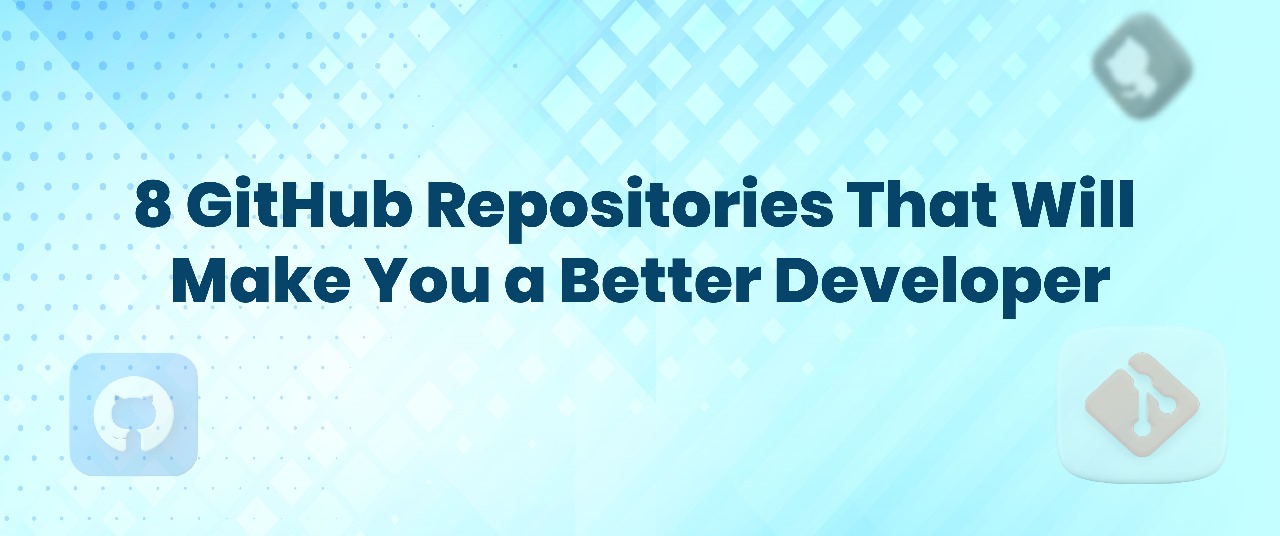
Every developer, whether they are just beginning their journey into the world of programming or have years of experience behind them, constantly faces the challenge of learning new technologies, practicing coding skills, and staying updated with industry trends. While online tutorials and courses provide structured lessons, they often lack the practical depth that real-world projects and examples offer. This is where GitHub comes in as a game-changing platform. It is not just a space for hosting code but rather a dynamic ecosystem where developers collaborate, contribute, and grow together.
In this article, we will explore 8 GitHub repositories that stand out as invaluable resources for developers of all levels. Each repository offers a different perspective—from algorithm practice and curated resources to system design, APIs, and practical projects. By diving deep into these repositories, you can enhance your skills, expand your knowledge, and gain the confidence needed to excel in the fast-paced tech industry.
Why GitHub Repositories Are Essential for Developers

GitHub repositories serve as a developer’s treasure chest of opportunities. They are not just collections of code but living examples of how software is built, maintained, and improved through collaboration. When you interact with repositories, you witness coding styles from different contributors, learn the nuances of code documentation, and see how small contributions evolve into impactful changes. This exposure allows you to grow far beyond theoretical learning and step into the mindset of professional developers who solve complex problems daily.
Moreover, repositories are like open books that showcase best practices, standards, and workflows that would otherwise take years of experience to grasp. From version control techniques to modern frameworks, GitHub repositories give you insights into industry practices while giving you the chance to experiment hands-on.
How Open-Source Projects Shape Developer Skills
Open-source projects are not only about writing lines of code but also about becoming part of a global community where learning, collaboration, and knowledge sharing never stop. By exploring repositories, you can sharpen your problem-solving ability, learn to break down tasks into manageable steps, and understand how to write maintainable code. Contributing to open-source also develops soft skills like teamwork, communication, and adapting to constructive feedback—qualities that are as important as technical expertise.
Repository 1 – FreeCodeCamp
Why It’s Useful
FreeCodeCamp is one of the most impactful learning platforms available to programmers worldwide. Its GitHub repository houses the entire curriculum, allowing learners to not only go through structured lessons but also see how everything is built and maintained.
Key Features and Learning Opportunities
- Provides end-to-end full-stack projects that teach real-world application development.
- Offers thousands of exercises, challenges, and certifications across programming, web development, and data science.
- Encourages community-driven learning with contributors from all over the world actively improving content and code.
By following along, you gain both theoretical knowledge and the practical ability to create production-ready applications.
Repository 2 – The Algorithms
Why It’s Useful
If you want to strengthen your foundation in data structures and algorithms, this repository is a goldmine. It contains implementations of algorithms across multiple programming languages, making it a versatile resource for learners worldwide.
Key Features and Learning Opportunities
- Contains hundreds of algorithm implementations covering sorting, searching, dynamic programming, graph algorithms, and more.
- Each implementation is written in a simple and understandable style, which helps you compare different approaches in different languages like Python, C++, and Java.
- An ideal resource for preparing for technical interviews, coding competitions, or simply brushing up on algorithmic thinking.
Repository 3 – Awesome
Why It’s Useful
The “Awesome” repository is essentially a massive collection of categorized lists that compile the best resources across almost every imaginable area of technology.
Key Features and Learning Opportunities
- Helps you discover frameworks, tools, and libraries in areas such as web development, machine learning, security, and DevOps.
- Constantly updated by the community to reflect the latest trends and resources.
- Allows developers to expand their horizons by exploring technologies they may not encounter in traditional tutorials.
Think of it as a well-curated library where you can always find the next area to explore.
Repository 4 – Developer Roadmap
Why It’s Useful
For anyone unsure of what to learn next, this repository provides clear, visual, and structured roadmaps for different roles within the tech world.
Key Features and Learning Opportunities
- Includes career paths for frontend developers, backend developers, DevOps engineers, and more.
- Updated frequently to align with industry standards and emerging technologies.
- Helps beginners avoid confusion and professionals plan their upskilling journey in a structured manner.
This repository acts as a compass for your learning journey, pointing you in the right direction based on your career goals.
Repository 5 – System Design Primer
Why It’s Useful
System design is often considered one of the most challenging aspects of technical interviews and large-scale software engineering. This repository simplifies those complex concepts.
Key Features and Learning Opportunities
- Breaks down system design concepts into digestible explanations.
- Provides real-world case studies of how companies like Twitter or Netflix might design their systems.
- Helps developers understand scalability, reliability, and performance optimization.
By mastering these concepts, you gain the ability to think beyond writing code and start architecting robust, efficient systems.
Repository 6 – Public APIs
Why It’s Useful
APIs are at the heart of modern development, and this repository brings together a comprehensive collection of free APIs across different fields.
Key Features and Learning Opportunities
- Includes APIs for everything from weather and news to finance, machine learning, and gaming.
- Ideal for experimenting with API integration and building unique personal projects.
- Gives developers exposure to working with real-world data and services without worrying about costs.
This repository encourages creativity, allowing you to build projects powered by external data sources.
Repository 7 – Project-Based Learning
Why It’s Useful
This repository takes the philosophy of “learning by doing” to the next level, providing a wide range of project ideas across different domains.
Key Features and Learning Opportunities
- Offers hands-on project suggestions for web, mobile, artificial intelligence, and more.
- Allows you to apply theoretical knowledge to practical, real-world problems.
- Helps improve problem-solving skills while giving you projects to showcase in your portfolio.
For learners who find it difficult to bridge the gap between theory and practice, this repository is the missing link.
Repository 8 – 30 Seconds of Code
Why It’s Useful
This repository is all about efficiency and simplicity, offering quick code snippets that solve everyday programming problems in seconds.
Key Features and Learning Opportunities
- Provides reusable snippets in JavaScript, Python, and other languages.
- Ideal for developers who want to quickly learn practical coding tricks.
- Boosts productivity by helping you understand and implement solutions without overcomplicating things.
It’s the perfect resource for those small moments when you need a fast and effective solution.
Tips to Maximize Learning from GitHub
To get the most out of GitHub, do more than just read the code. Clone repositories, run projects locally, and tweak them to see how changes affect outcomes. Always go through documentation, as it not only explains how a project works but also teaches you how to document your own work effectively. Participate in discussions, ask questions, and gradually step into contributing by fixing minor issues or updating documentation.
How to Contribute to Open-Source Repositories
Contributing may seem intimidating at first, but starting small makes a big difference. Look for issues labeled as “good first issue,” as these are meant for beginners. Even small contributions, such as correcting typos in documentation or fixing minor bugs, can help you gain confidence. Always follow the contribution guidelines and respect the maintainers’ instructions, as open-source is as much about teamwork as it is about coding.
Conclusion
The world of GitHub is vast, but if you know where to look, it can become your ultimate guide to becoming a better developer. From comprehensive learning paths and algorithm challenges to real-world project ideas and system design concepts, the repositories we explored provide everything you need to elevate your skills. The journey of becoming a skilled developer doesn’t happen overnight, but with consistent exploration and contribution to these resources, you’ll steadily build the expertise and confidence to stand out in the tech industry.
Call to Action
At Codeed Labs, we believe growth happens through consistent practice, exploration, and mentorship. If you’re serious about improving your coding skills, start exploring these repositories today and don’t stop at just reading—contribute, experiment, and build. To take your learning journey further with structured support, reach out to us for mentorship, career guidance, and hands-on training that will transform your potential into expertise.
FAQs
Q1: Do I need advanced coding skills to use these repositories?
Not at all. Many of the repositories mentioned are designed to be beginner-friendly while still offering depth for advanced learners, which means you can gradually build up your expertise.
Q2: Can I contribute to these repositories as a beginner?
Yes, open-source thrives on community contributions, and maintainers often create beginner-friendly issues specifically to encourage new contributors.
Q3: Are these repositories free to access?
Yes, every repository mentioned here is completely free and publicly available for developers worldwide, with no hidden costs.
Q4: How do I keep track of updates in these repositories?
You can use GitHub’s “watch” feature to stay updated on discussions, commits, and new releases, ensuring you never miss important changes.
Q5: What’s the best way to practice with these repositories?
The best approach is to clone the projects, follow along with the instructions, build your own variations, and eventually try contributing back with fixes or new features.
Table of Content
 5.0
5.0
Unlock your new design team today
Get a team of skilled professionals and all the benefits that come with top-grade in-house designers—for a flat fee.
Book a free call


